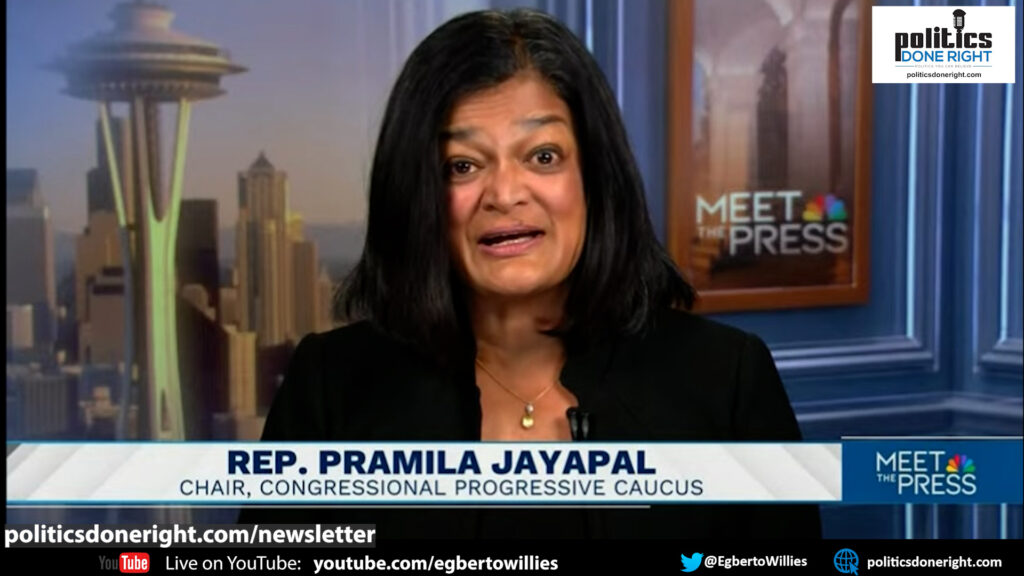Rep. Pramila Jayapal did a perfect job in converting a cookie-cutter question to a substantive response as she enumerated the terror Netanyahu’s IDF is exerting on Palestinians in Gaza.
Jayapal lists Netanyahu’s reign of terror.
The recent statements made by Representative Pramila Jayapal on “Meet the Press” bring into sharp relief the humanitarian crisis unfolding in Gaza under the tenure of Israeli Prime Minister Benjamin Netanyahu. Her comments paint a vivid picture of what is a “revenge-driven reign of terror,” shedding light on the stark asymmetry between the Israeli and Palestinian experiences of the conflict.
- Congresswoman Jayapal’s Critique: Rep. Pramila Jayapal on “Meet the Press” emphasizes the severe consequences of Benjamin Netanyahu’s policies on Palestinians, particularly in Gaza, underlining the asymmetry of damage and death tolls compared to Israel.
- Humanitarian Crisis in Gaza: Jayapal highlights the stark disparity in casualties, with 8,000+ Palestinians killed, including 3,000+ children, due to Israeli airstrikes, and a dire humanitarian situation, including potential deaths of premature babies and risks to pregnant women in Gaza.
- Call for Ceasefire and Humanitarian Aid: The Congresswoman calls for a ceasefire or at least a reduction in hostilities and stresses the importance of immediate and sustained humanitarian aid while condemning the United States-reduced-credibility due to what she perceives as a double standard in its international stance.
- Condemnation of Collective Punishment: Jayapal condemns the blockade and the collective punishment imposed on Gaza, drawing parallels to the global condemnation of Russia’s actions in Ukraine and questioning the morality of Israel’s actions.
- Criticism of U.S. Policy and Appeal for Moral Consistency: Jayapal argues that the U.S. loses moral authority by not equally condemning actions of allies that resemble those of adversaries, calling for a reevaluation of the U.S.’s role and policy consistency on the international stage.
At the core of Jayapal’s argument is the significant imbalance of harm inflicted upon the Palestinian people, particularly those living in the Gaza Strip, as compared to their Israeli counterparts. She details with stark numbers the toll that Israeli policies and actions have taken: 8,000+ Palestinians dead, a harrowing figure that includes 3,000+ children. Beyond the loss of life, Jayapal speaks to the infrastructure damage in Gaza, implying a systematic dismantling of essential services and the very fabric of society. The destruction in Gaza is contrasted with that in Israel, suggesting a disproportionate Israeli response to Hamas’ aggression. Jayapal’s dialogue here evokes a powerful image of devastation that calls into question the ethical underpinnings of the Netanyahu administration’s actions.
Jayapal touches on the humanitarian crisis that has resulted from the conflict. She shares a chilling forecast for the survival of premature babies in Gaza and the plight of pregnant women—powerful imagery meant to convey the urgency of the situation. Her appeal is not only for a ceasefire but also for immediate and sustained humanitarian aid to address the ongoing disaster.
The Congresswoman’s call for a ceasefire is not only a plea for peace but also an indictment of the United States’ complicity through silence and inaction. When one parallels the global condemnation of Russia’s siege of Ukraine, Jayapal posits that the United States’ failure to call out Israel’s actions in Gaza with similar vigor erodes American moral authority on the global stage. This challenges the narrative often adopted by American foreign policy, which positions the U.S. as a beacon of democracy and human rights.
Jayapal’s condemnation of what she implies is a form of collective punishment meted out upon Gaza by Israel and tacitly supported by the U.S. is a stark reminder of the complexities of international politics. She emphasizes that humanitarian agencies have seen their efforts to deliver aid hampered, with a significant reduction in aid trucks allowed into Gaza. This critique leads to a larger discussion about the role of the U.S. in international conflicts and its selective engagement, which, according to Jayapal, illustrates a double standard that undermines the country’s credibility.
In her appeal for moral consistency, Jayapal does not shy away from acknowledging the actions of Hamas, labeling it as a terrorist organization and separating the identity of Hamas from that of the Palestinian people. This distinction is crucial in her argument, as it recognizes the need for nuanced solutions that address the root causes of the conflict without further victimizing the Palestinian populace.
The essence of Jayapal’s appearance on “Meet the Press” was to urge the American public and the international community to reevaluate their perceptions and policies regarding the Israel-Palestine conflict. What is needed is a shift from a revenge-driven policy to one grounded in justice and moral consistency. Jayapal’s discussion goes beyond the call for a ceasefire; it is a call to action for the U.S. to reassess its role in perpetuating conflicts through policy and silence and to aspire to the same standards of human rights and dignity for all peoples that it espouses globally.
Representative Jayapal’s narrative is an impassioned plea for equity in foreign policy, a demand for empathy in international relations, and a stark reminder of the real and tragic human cost of conflict. Her appearance is not merely a commentary on the Israeli-Palestinian conflict but a broader critique of the current state of international affairs, where geopolitical strategy often overshadows the lived realities of those on the ground. As a progressive voice in Congress, Jayapal challenges her colleagues and the nation to look beyond political rhetoric and confront the human toll of foreign policy decisions, advocating for a world where peace is pursued with the same vigor as any other strategic interest.
Viewers are encouraged to subscribe and join the conversation for more insightful commentary and to support progressive messages. Together, we can populate the internet with progressive messages that represent the true aspirations of most Americans.

